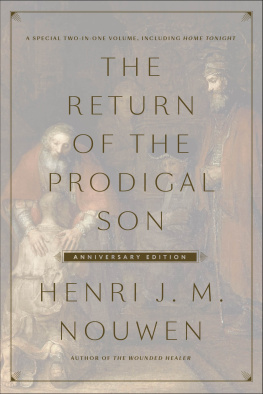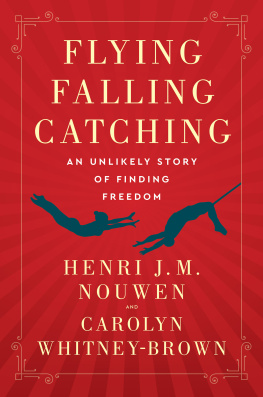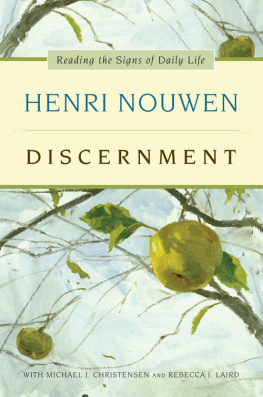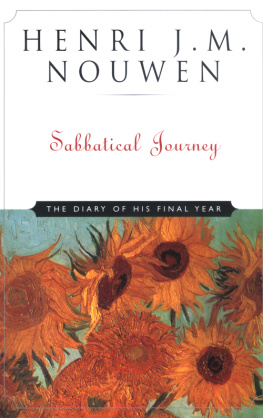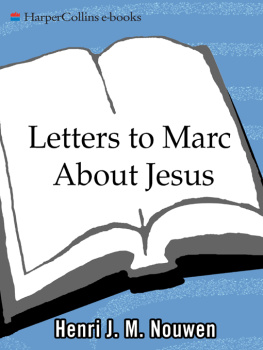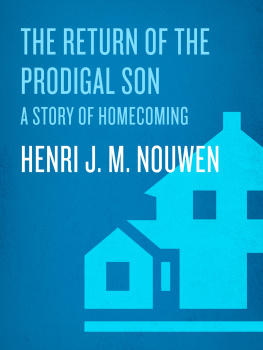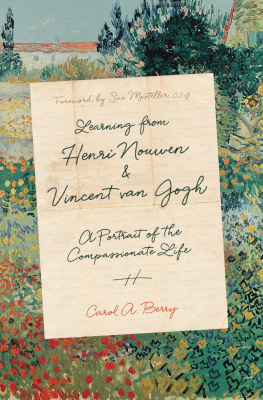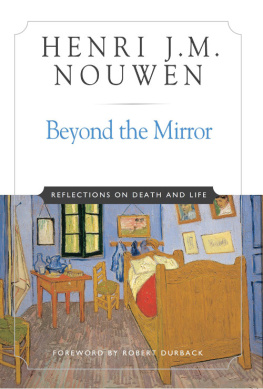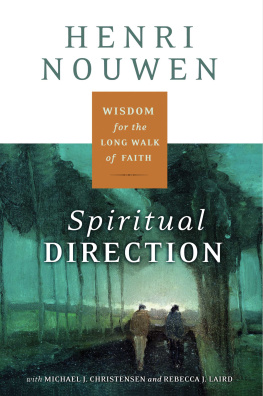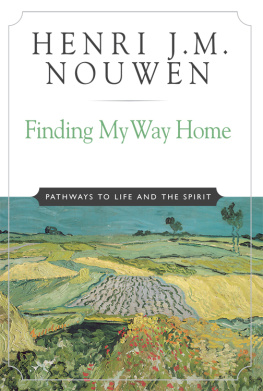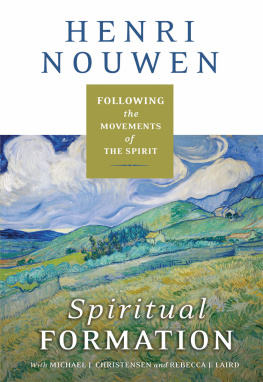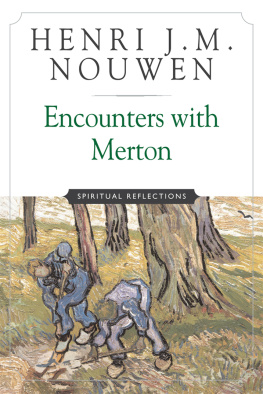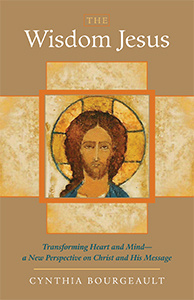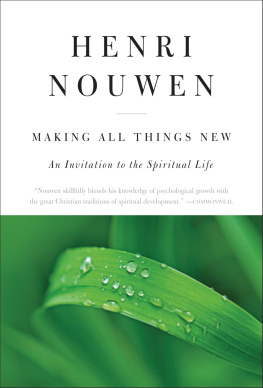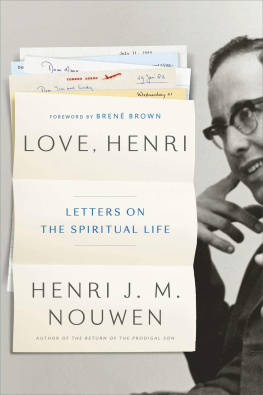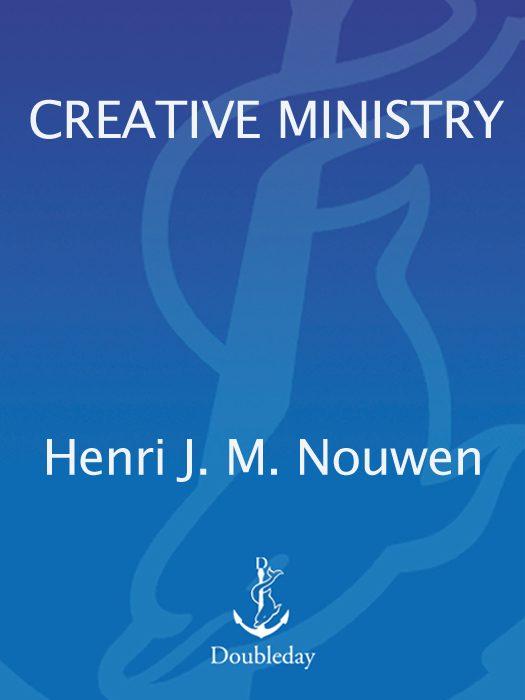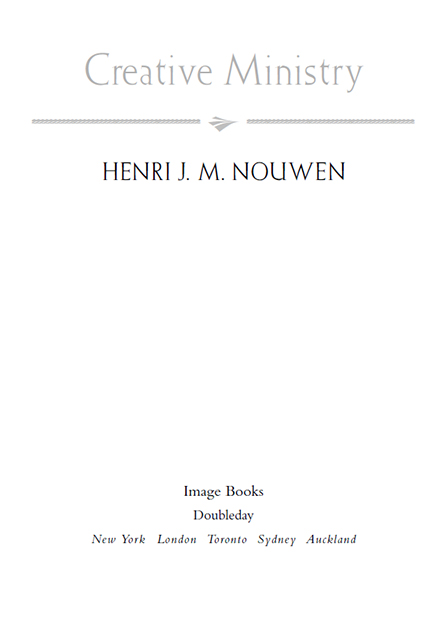AN IMAGE BOOK
PUBLISHED BY DOUBLEDAY
a division of Random House, Inc.
IMAGE, DOUBLEDAY , and the portrayal of a deer drinking from a stream are registered trademarks of Random House, Inc.
The Library of Congress has cataloged the hardcover edition as follows:
Nouwen, Henri J. M.
Creative ministry
1. Pastoral theology. I. Title.
BV4011.N68 1971 73-139050
MARC
eISBN: 978-0-8041-5206-8
Copyright 1971 by Henri J. M. Nouwen
Revisions copyright 2003 by the Estate of Henri J. M. Nouwen
All Rights Reserved
This Image Books Edition
December 2003
v3.1
OTHER BOOKS BY HENRI J. M. NOUWEN
The Wounded Healer
The Return of the Prodigal Son
Lifesigns
The Road to Daybreak
A Cry for Mercy
Reaching Out
The Inner Voice of Love
Clowning in Rome
The Genesee Diary
Aging
Compassion
To Seward, Helen, and Anne Hiltner
in memory of
James Seward Hiltner
Preface to the New Edition
T his new edition of Creative Ministry springs from collaboration among several parties who believe its message to be as relevant today as it was when Henri first published it in 1971. His core message is a call for ministers to look with new glasses at those they serve and to see the person in need not primarily as a problem but as a gift. Ministers then allow themselves to receive from and to let their ministry be shaped by the poor, who in the words of Saint Augustine are the treasure of the Church.
This is indeed a creative vision of ministry and one that challenges each of us to open ourselves to the blessedness that Jesus recognizes in the poor. Written when Henri was teaching and lecturing in academic circles, this vision continued to inspire his vocational journey so that he ended his life living with and ministering primarily to people with disabilities and those who came to assist them. He said toward the end of his life, I am convinced that this is the place from which I must live and minister. It is from my relationships here that Jesus inspires me to speak and to write.
I am grateful to Trace Murphy, Siobhan Dunn, and Joan Schadt at Doubleday for listening to suggestions about the revised text and for allowing time for the polishing of the original text. Maureen Wright at the Henri Nouwen Literary Centre in Toronto not only served as go-between for the publishers and editors but gave creative support to keep the task on the rails to completion. Finally, I am grateful to Sean Mulrooney, who did the major work of reediting the text to include more recent images and examples and to employ more inclusive language. He was precise and insightful, finding words that were faithful to the core message but relevant to the postmodern mind.
As collaborators, we hope that for you, the reader, Henris words will continue to bear fruit in the lives of those who hear Good News through your unique and precious ministry.
Sue Mosteller
Literary Executrix of the
Henri Nouwen Estate
July 2003
Acknowledgments
T his book would never have been started without the stimulation of the summer school students of the University of Notre Dame, who by their enthusiasm encouraged me to write and keep writing during six hot weeks, and who convinced me that spirituality can be discussed with a sense of humor. This book would never have been finished, however, without the honest and straightforward criticism of the Chicago priests, which made me rethink different issues and rewrite different chapters.
I owe much to the members of the Moreau Community for their hospitality, expressed not only by the offer of a quiet room in which to write but also by supportive friendship when writing did not seem very easy. I am especially thankful to Louis Putz for making me feel at home, to Jim Buckley for his constant help, and to Bob Antonelli for his personal interest, which made me beat the deadlines.
I also want to express my deep appreciation to Charles Sheedy and Jim Burtchaell for their invitation to give the lectures, to Jack Egan and Don McNeill for their valuable suggestions for corrections, and to Betty Bartelme for her skillful help during the final stages of the manuscript.
I am very thankful to Rita Gorkowski and Carolyn Dalsgaard, who spent many hours typing and retyping the manuscript, and to Jeff Sobosan, who was so generous as to interrupt his own writing to reshape quite a few of my crooked sentences.
The Frank J. Lewis Foundation, sponsor of the pastoral theology program at the University of Notre Dame, offered the financial support for the preparation of this text.
I have dedicated this book to Seward Hiltner, teacher and friend, who introduced me into the field of pastoral theology; to his wife Helen and daughter Anne, who taught me much through their friendship and trust; and to his son James Seward, who made me realize that the length of life is less important than the intensity and sincerity with which it is lived.
H. N.
Jesus said to Simon Petrus:
When you were young
you put on your own belt
and walked where you liked;
but when you grow old
you will stretch your hands
and somebody else will put a belt round you
and take you where you would rather not go.
John 21:18
INTRODUCTION
Beyond Professionalism
T he main concern of this book is the relationship between professionalism and spirituality in the ministry. Since many very concrete experiences and events made my interest in this relationship grow, I would like to start with one of the cases that will illustrate the theme that runs through the following chapters.
One day during the past year a parish priest presented to a small group of pastors, of which I was a member, a report of his hospital visit to a twenty-six-year-old married woman who suffered from the fatal Hodgkins disease. The priest, a very intelligent pastor, was quite aware of the fact that this young woman would never leave the hospital and that she probably would die within the coming year. He brought the report of his pastoral visit to the group because he wanted to consult his fellow ministers about how to be of real help to his parishioner in the months ahead.
He described the young woman as a very happy, open person with a good sense of humor and full of energy. He wrote down parts of his conversation with her, word for word as far as he could remember, and concluded with the honest confession that he had felt extremely nervous during the visit and very uneasy and dissatisfied as he had left her alone in the ward.


